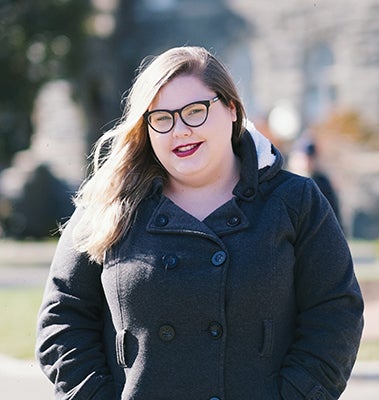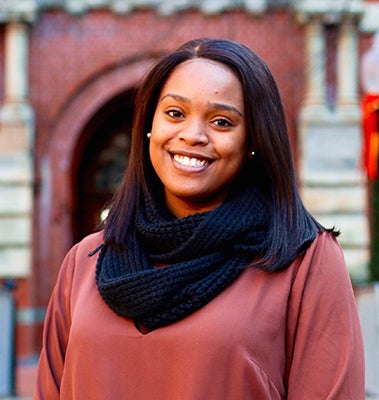Scott, Vaughan Named Truman Scholars


Amanda Scott (L) and Shakera Vaughan (R), both junior government majors, have been awarded Harry S. Truman Scholarships. (Georgetown University photos)
April 13, 2018 — Amanda Scott (C’19) and Shakera Vaughan (C’19), both Georgetown College government majors and members of the Georgetown Scholarship Program, have been named 2018 Harry S. Truman Scholars.
The Truman Scholarships, which contribute $30,000 toward graduate school tuition, are awarded annually to a select group of 50-65 students from across the country who demonstrate exceptional leadership and interest in public service. Melissa Morgan (C’19) was also a finalist for the award.
This marks the second consecutive year that multiple Georgetown students have been named Truman Scholars: Cristine Stark (F’18) and Daniel Wassim (F’18) each won scholarships last year.
AMANDA SCOTT
Amanda Scott did not take a traditional path to the Hilltop.
Raised in a low-income household in Mobile, Ala. — mostly by her mother, who worked odd jobs to pay the bills — Scott didn’t have a formal education past the fifth grade.
“I was ‘home-schooled,’ but really I was mostly self-taught,” she said.
Scott eventually earned her General Equivalency Degree, then enrolled at Coastal Alabama Community College in the two-year paralegal studies program. After graduating summa cum laude and setting her sights on four-year schools, she chose Georgetown for its Washington D.C. location, service-oriented mission, and — perhaps most importantly — the Georgetown Scholarship Program.
“I’m a proud member of the Georgetown Scholarship Program,” Scott said. “Some of the best friends I’ve made at Georgetown are GSPers.”
With the support of GSP, Scott dove headfirst into her coursework, focusing on classes on government and history. She specifically credits Prof. Michael Kazin’s U.S. history seminars and Prof. Barbara Feinman Todd’s introduction to journalism class as helping her develop academically.
“These classes helped me hone my research and investigative skills, but they also taught me about myself and my passions, through seeing what I chose to write about when given absolute freedom,” Scott said.
Meanwhile, Scott’s newfound proximity to public service opportunities — a major factor in her decision to apply — began to pay dividends. She interned at the Lawyer’s Committee for Civil Rights, the office of D.C. Mayor Muriel Bowser, and the Civil Rights Division at the U.S. Department of Justice.
Having experienced poverty growing up, Scott knew she wanted to attend an elite law school, go into public interest law, and advocate for poor and marginalized communities. When she discovered the Truman Scholarship information on Georgetown’s Office of Fellowships website, she knew it could help her achieve her goals.
But for Scott, applying wasn’t just a rational career decision. It was personal.
“I’ve gone through a lot in my life to get to this point and stay here,” she said. “I applied because I wanted to show myself that I am good enough — that people like me are good enough.”
SHAKERA VAUGHAN
Shakera Vaughan, a Richmond, Va. native, also chose Georgetown largely due to the resources the university commits to helping students from all backgrounds thrive, like GSP and the Center for Multicultural Equity and Access.
“Georgetown not only gave me the financial support to come here, but also gave me the resources to stay here,” she said. “I knew the opportunities in the nation’s capital were endless and I wanted to try and take advantage of what is supposed to be the ‘best four years of my life.’”
Like many first-year students, Vaughan took some time to adjust to college life.
“I didn’t quite feel like I belonged,” she said. “I had experienced imposter syndrome.”
But before long, involvement in campus clubs — particularly GU Women of Color (GUWOC) — helped her feel more invested in her new home.
“I was given a strong sisterhood of such phenomenal and welcoming women,” Vaughan said. “Not only did I finally feel like I belonged, but I was a part of an organization who really set out to advocate for marginalized groups of people.”
Grounded by her new community, Vaughan flourished on the Hilltop. She joined the Gospel Choir and the Baker Scholars, one of Georgetown’s most prestigious undergraduate programs. She became vice president of GUWOC and helped organize the BRAVE Summit, which celebrates Black women and bring their voices to the forefront of conversations.
Vaughan took full advantage of the academic opportunities afforded her, enrolling in courses that helped her explore fascinating new ideas.
“One lesson that I quickly realized was that my professors have so much wisdom to offer in and outside the classroom, and all you had to do was talk to them,” she said. “Classes like ‘Education/Politics/Policymaking,’ taught by Douglas Reed, and ‘Public Housing: Theory and Practice,’ taught by Brian McCabe, have pushed me to think outside of my normal realm.”
For Vaughan — who had already received competitive fellowship offers — the Truman Scholarship represented a life-changing opportunity.
“This scholarship means everything to me, because it makes graduate school an option now, she said. “It brings tears to my eyes knowing that the people who sat on my panel believed in my vision and wanted to help me accomplish this.”
Vaughan hopes to apply to Master’s programs in public administration for the fall of 2019. Wherever she ends up, she knows she’ll keep her roots in mind.
“I am doing all of this for my community back home,” Vaughan said. “Ultimately, it is the city of Richmond that drives me towards my goals.”
— Patrick Curran
About the Truman Scholarship
The Harry S. Truman Scholarship Foundation was created by Congress in 1975 to be the nation’s living memorial to President Harry S. Truman. The Foundation has a mission to select and support the next generation of public service leaders. The Truman award has become one of the most prestigious national scholarships in the United States.
Annually, candidates for the Truman Scholarship go through a rigorous, multi-stage selection process. In 2018, there were 756 candidates for the award nominated by 311 colleges and universities, a record number of institutions. The 194 finalists for the award were interviewed in March and early April at one of sixteen regional selection panels. Fifty-nine new Truman Scholars were selected in 2018. They will receive their awards in a ceremony at the Harry S. Truman Presidential Library and Museum on Sunday, May 27, 2018.
Recipients of the Truman Scholarship receive a $30,000 scholarship toward graduate school and the opportunity to participate in professional development programming to help prepare them for careers in public service leadership.